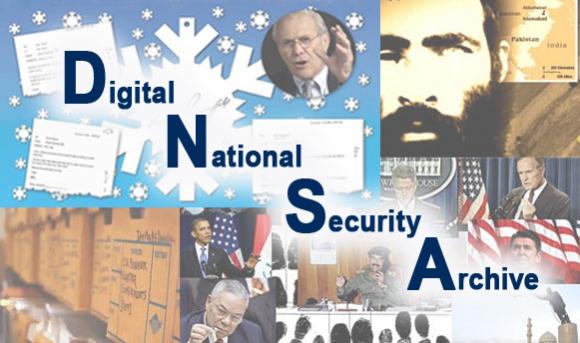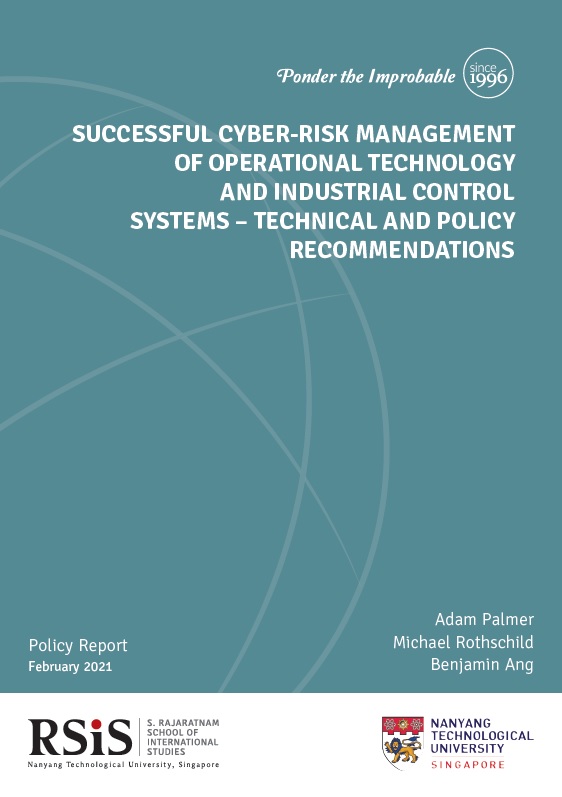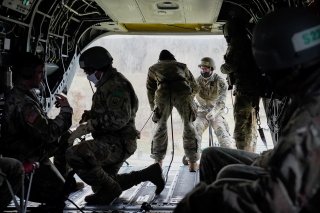A paper on Chinese Intransigence in Ladakh: An Overview written by Major General PK Mallick, VSM (Retd) has been published by The United Service Institution of India (USI) as an occasional paper.
19 February 2021
The Changing Power-Relations in the Indo-Pacific: Decoding New Delhi’s Strategic Outlook
Netajee Abhinandan

The Taliban Close In on Afghan Cities, Pushing the Country to the Brink
By Thomas Gibbons-Neff and Taimoor Shah
PANJWAI, Afghanistan — The Taliban have been encroaching on key cities around Afghanistan for months, threatening to drive the country to its breaking point and push the Biden administration into a no-win situation just as the United States’ longest war is supposed to be coming to an end.
Around the northern city of Kunduz, despite the winter’s fierce cold, the Taliban have taken outposts and military bases, using small armed drones to terrorize Afghan troops. In neighboring Pul-i-Khumri, they have seized important highways in a stranglehold of the city, threatening main lifelines to Kabul, the country’s capital.
And in the city of Kandahar, a bedrock of historic and political importance and an economic hub for the country’s south, Taliban fighters have pummeled the surrounding districts, and moved closer to taking the provincial capital than they have in more than a decade.
The Taliban’s brazen offensive has put the Biden administration into a dangerous political bind. Under the deal struck by President Donald J. Trump with the Taliban last year, all foreign troops — including the remaining 2,500 American service members who support Afghanistan’s beleaguered army and security forces — are scheduled to withdraw by May 1, leaving the country in an especially precarious state.
If the Biden administration honors the withdrawal date, officials and analysts fear the Taliban could overwhelm what’s left of the Afghan security forces and take control of major cities like Kandahar in a push for a complete military victory or a broad surrender by the Afghan government in the ongoing peace negotiations.
But if the United States delays its withdrawal deadline, as a congressionally appointed panel recommended on Feb. 3, the Taliban would most likely consider the 2020 deal with the United States void, which could lead to renewed attacks on American and NATO troops, and potentially draw the United States deeper into the war to defend Afghan forces, whom the Taliban could still retaliate vigorously against.
What If the Afghan Peace Process Fails?
Prof. em. Marvin G. Weinbaum and Dr Shanthie Mariet D’Souza
While mindful of the looming obstacles, most Afghans along with much of the international community continue to place their faith in the eventual success of the current peace process. Understanding military victory over the Taliban to be unachievable and repelled by the idea of unending warfare, they have placed their faith in diplomacy. The hope is that the Taliban, conscious of the difficulties in achieving an outright military victory, will be ready to sign a political deal once it has extracted enough concessions. Ultimately, the Taliban is conceived of as a transactional actor. That ideology rather than pragmatism might dominate Taliban thinking is conveniently dismissed. Hardly surprisingly, then, little attention is given to what might follow should the current peace talks prove fruitless. Negotiations could very well drag on unproductively for many more months, even extend to years, and at any point in time collapse entirely. Despite the agonizingly slow progress, both sides for their separate reasons appear for now hesitant to quit the negotiations. But Taliban reluctance could quickly vanish should a Biden administration declare its intention to retain a residual counterterrorism troop presence in the country beyond April.
A Taliban spokesman has publicly stated that anything less than a full U.S. withdrawal is a deal breaker. And with the level of violence in the country continuing to rise, the Kabul government may soon find it politically too costly to remain in the talks. For whatever reason the negotiations might break down, the reactions among a disillusioned Afghan public, a disunited political elite, and sorely disappointed international community could well determine the future of the Ashraf Ghani government and of Afghanistan’s Islamic Republic. In the wake of failed peace negotiations, the government can be expected to express its confidence in the country’s ability to soldier on.
Social Media in Pakistan: The War of the Narratives
Dr Qaisar Rashid
The “post-truth” age has inflicted serious harms on Pakistan, and the authorities are now making a concerted effort to control social media because it has gained the power to deconstruct official narratives. In also making people aware of their past errors and prompting them to find the truth, social media is thereby transcending the boundaries imposed by the judiciary-military mix.
The “post-truth” age has inflicted serious harms on Pakistan.
Fake news had a decisive impact on the 2018 general elections in Pakistan.
Social media possesses the power to not only construct, but also deconstruct, a narrative.
In Pakistan, the power of social media to unravel a narrative has seen the judiciary-military mix impose restrictions on it.
Contrasting and competing narratives now leave many Pakistanis seeking the truth.
In Pakistan, the government’s efforts are underway to control social media because it has gained the power to deconstruct a narrative that had made people think and act in a desired way in the past. Social media has, however, made people aware of their past errors and prompted them to find the truth, thereby transcending the boundaries imposed by the judiciary-military mix.
Analysis
Rumsfeld Lacked Intel on Who The Enemies Were Two Years After Afghanistan Invasion, Newly Published “Snowflakes” Show

Former Washington Post reporter Robin Wright obtained a number of Rumsfeld’s snowflakes and published an in-depth article on them in November 2007, revealing the secretary’s “brusque management style,” disdain for media criticism and desire to “reshape public opinion of the Iraq war.” In 2011, Rumsfeld published a small subset of snowflakes to help publicize his memoir, Known and Unknown. The Archive filed a Freedom of Information Act that same year for the entire collection. After six years of waiting without a single document released, despite promises from DOD, the Archive litigated with pro bono representation from Skadden, Arps, Slate, Meagher & Flom. In an August 7, 2017, hearing, Department of Defense attorney Mark Harrington confessed, "As far as the delay in the initial response to the request, all I can do is fall on our sword; that was too long." Judge Tanya S. Chutkan agreed, calling the six-year delay "unconscionably long."
Washington, D.C., February 1, 2021 – On September 9, 2003, Secretary of Defense Donald Rumsfeld wrote to Under Secretary of Defense for Intelligence Steve Cambone expressing concern about information from interrogations at military sites in Iraq and Afghanistan. The Secretary wrote, “The lack of clarity as to who the enemies are, and what the problems are from an intelligence standpoint in Afghanistan and Iraq is serious.” Six weeks later, on October 23, 2003, Rumsfeld followed up: “I have no visibility into what kind of intelligence we are getting from the interrogations of the 35 or 40 of the top 55 Iraqis we have captured. Please get me some information.”
Will China Be a Global Vaccine Leader?
Deborah Seligsohn, Jenny Lei Ravelo

One year ago this month, a handful of Chinese military scientists reportedly received an experimental coronavirus vaccine. Almost certainly the first human trial, the injection was a shot across the bow: As manufacturers and governments across the globe raced to develop vaccines, China’s would be at the forefront. In the U.S. and Europe, vaccine rollouts have gotten off to rocky starts. China, meanwhile, has already sent tens of millions of doses to Turkey, Indonesia, the Philippines, and elsewhere, with many more coming. Like most of the world, China has also joined the World Health Organization’s COVAX, a global initiative to subsidize COVID vaccine research, production, and delivery to ensure the poorest countries have sufficient vaccine access.
Beijing stands to reap major rewards by becoming the supplier of choice—or necessity—throughout low- and middle-income countries. China has expanded its international aid efforts in recent years and stressed its commitment to “south-south” cooperation. Under the umbrella of its ambitious and controversial Belt and Road initiative is a Health Silk Road. Though still vague, the term reflects China’s ambitions to make itself a global public health leader. Winning the vaccine race would be a diplomatic boon.
Public concern over the vaccines, however, may pose a roadblock to achieving inoculation targets. Some mistrust around the world of Chinese-manufactured COVID vaccines stems from a lack of public data about them, previous safety issues of Chinese-produced vaccines, but also to far more nebulous political or emotional responses. Chinese state media has gone on the defensive, attacking Western vaccines and raising questions over their safety—efforts that have fed into foreign anti-vax movements, but have done little to raise public faith in Chinese-produced vaccines.
Chinese Investments in Israel: Developments and a Look to the Future
Doron Ella

China’s economic involvement in Israel has expanded over the past decade, as Chinese companies have invested in a host of Israeli firms, primarily in high-tech fields. An in-depth and comprehensive examination of this topic shows that Chinese investments in Israel reached a peak in 2018, after which they began to wane. There are several reasons for this: changes in priorities in China, the consequences of the global coronavirus pandemic, and perhaps also a change in the investment climate in Israel with regard to Chinese companies due to American political pressure. This study shows that Chinese state-owned enterprises invest primarily in Israeli infrastructure, while private companies and venture capital funds are more focused on the high-tech sector. The issue of Chinese investments in Israel has raised potential security-related concerns in the US, yet Chinese investments account for less than 10 percent of foreign capital investments in Israel, way behind investments originating in the United States and Europe. The criticism is not aimed at the scope of those investments, but is rather based on concerns that they are in technological fields that are considered security-sensitive.
The world has seen an influx of Chinese foreign direct investment (FDI) in the past two decades, particularly following the global financial crisis in 2008. The Chinese invest both in developing and developed countries, albeit usually in different industry sectors: in developing countries Chinese investments are focused mainly on infrastructure, while in developed countries they tend to be in the technology and finance sectors, a trend that is growing in scope. The increase in Chinese investments around the world, and in Israel specifically, can be attributed to a number of factors: the accumulation of foreign currency by Chinese companies; the dominant positioning of these companies in the local Chinese market, and a government policy that encouraged Chinese companies to invest in foreign markets (known as the “Go Global” policy); the economic need of Chinese companies for innovative technologies and know-how; the desire of Chinese companies to position themselves as international brands; the need to enable the provision of services to Chinese companies operating overseas; and as a way to circumvent trade barriers.
Europe's China Chimera
Peter Rough

When Xi Jinping, the chairman of the Chinese Communist Party (CCP), dreams of global domination, he worries about one thing above all else: a hostile United States backed by its allies—and on the Eurasian landmass, the US has no more important ally than Europe. As a result, Xi has worked to weaken the transatlantic alliance through a two-pronged economic stratagem. First, under the guise of globalization, China has insinuated itself into the European economy, creating dependencies. Second, Beijing is manipulating those dependencies to hollow out and supplant Europe’s advanced economies. To give this deception cover, China has built a vast political network across Europe, from basic sympathizers to outright spies.
Until recently, barely anyone took notice, but the financial crisis and forever wars of the past two decades, culminating in the election of Donald Trump as president of the United States, lured the self-confident Xi out into the open. During the coronavirus pandemic, China revealed an aggressive attitude toward Great Britain’s former colonies that shocked the United Kingdom. In the span of mere months, London shifted from cooperation to confrontation. In July, it became the first country in Europe to block the Chinese telecommunications giant, Huawei, from its next-generation networks.
Germany, the continent’s most important country, still sees China as key to post-pandemic recovery and economic growth, however. Xi has exploited this attitude to strike an investment agreement with the European Union (EU), the chief purpose of which is to forestall a transatlantic approach under the new US president, Joe Biden. Together, the United States and Europe have unparalleled advantages against any competitor. Now is the time for cooperation, before Xi’s dreams become our collective nightmare.
Towards 'extreme competition': Mapping the contours of US-China relations under the Biden administration
The new US government under President Joe Biden is likely to adopt a significantly different approach to China than the Trump administration did. There are early indicators of how in its statements and actions in five key areas: economic relations, pandemic and climate change challenges, regional rivalry, and working with allies on values-based responses to China.
Members of Biden’s team have already signaled that the US-China relationship will be framed in less zero-sum terms and seek to balance competition and cooperation.
On economic relations, the administration will need to choose between a punitive and a constructive approach on trade and China’s industrial policy. The key indicator will be whether it continues Trump’s “decoupling,” especially in critical technology and supply chains or focuses instead on domestic renewal and competitiveness.
On the global pandemic and climate-change challenges, the administration has made clear it supports multilateral efforts, and its openness to cooperation with China. The crucial indicator will be whether it seeks a climate grand bargain with China or instead builds coalitions to compete with China on issues like green technology and “vaccine diplomacy.”
With regard to regional rivalry, the key indicator will be whether the administration emphasizes military and security issues or seeks to compete more on trade and investment issues, including infrastructure connectivity, in cooperation with others.
Also important is how much the administration makes shared values the basis of working with others on China-related issues. Indicators will come on forging common positions on China’s actions in Hong Kong and Xinjiang, and on its attempts at “economic coercion.” Values may take a back seat to forging common responses on issues like the Belt and Road Initiative or the South China Sea.
Tensions between London and Beijing
The facts: Signs of continued deterioration in Sino-British relations have been on full display lately as the UK takes steps to safeguard democracy and national security. On February 4, the UK’s communications regulator, Ofcom, withdrew China Global Television Network’s (CGTN) license to broadcast in the UK, after concluding that CGTN is ultimately controlled by the Chinese Communist Party. The same day, it was reported that three Chinese spies posing as journalists had been expelled from the UK.
The UK government is also investigating British universities and academics who might have unwittingly breached export control laws by transferring sensitive research to China. And last month it adopted measures to ensure that British organizations are not complicit in human rights abuses in Xinjiang through their supply chains. Manchester University terminated a collaboration with China Electronics Technology Corporation, which provides mass surveillance technology used by Chinese authorities in Xinjiang.
What to watch: Sparked by allegations that China is committing genocide against the Uighurs in Xinjiang, the UK parliament is currently debating an amendment to its forthcoming trade bill that would block post-Brexit free trade deals with countries that have committed genocide. Although the amendment narrowly failed to pass during a reading in the House of Commons this week, it is likely to be reinserted when the Bill returns to the House of Lords.
China Ups the Ante in the South China Sea: How will the US React?
Lindsay Hughes
China’s new law authorising its Coast Guard to use deadly force if required against foreign entities is likely a test for President Biden; it comes, however, with significant risk for Beijing, Washington and the region.
China passed a law authorising the China Coast Guard’s (CCG’s) use of firepower under certain circumstances against foreign vessels in waters ‘under China’s jurisdiction’. The Standing Committee of the National People’s Congress enacted the law, which came into force on 1 February 2021, on 22 January. The law authorises the CCG to take ‘all necessary measures, including the use of weapons, when national sovereignty, sovereign rights, and jurisdiction are being illegally infringed upon by foreign organisations and individuals at sea, or are facing an imminent danger of illegal infringement’. It also authorises the CCG to demolish ‘buildings, structures, and various fixed or floating devices’ from foreign organisations and individuals located ‘in the sea areas and islands under our jurisdiction’, if they have been established without Beijing’s permission.
Since the law specifically authorises the CCG to use force against foreign encroachments on its sovereignty, it may be safely assumed that those actions are to be taken in the South China Sea – at least in the first instance. That raises issues of international concern.
RESETTING AND REENGAGING U.S.-CHINA SOFT POWER RELATIONS
STEVEN W. LEWIS

If the global economy is to recover after the pandemic, the United States must reestablish mutually beneficial economic relations with China. But the new administration should be careful to resist unrestrained Chinese "soft power" influence on our education, research and creative industries, writes C.V. Starr Transnational China Fellow Steven W. Lewis.
This brief is part of a series of Baker Institute recommendations for the new Biden administration.
Greek-Turkish Tensions are Reshaping the Mediterranean
by Peter Suciu

Here's What You Need to Remember: The current hostilities are rooted in the Balkan Wars of 1913, which gave Greece all of the Aegean islands except Imbros and Tenedos. Many of the small islands are barely more than three nautical miles off the Turkish coast, and since the end of the Second World War, Turkish officials have called for a delimitation of territorial waters, air space, and other related zones of control.
Since 1952 Greece and Turkey have been de facto allies—for no other reason than both countries are members of NATO. Relations between the two nations have been marked with periods of open hostility since Greece won its independence from the Ottoman Empire in 1830, and in the past one hundred and ninety years the two nations have fought four rather major wars.
While the countries had a period of “good” and almost “friendly” relations in the 1930s and 1940s, relations have declined considerably in recent years and are now at the lowest point since the 1974 Cypriot coup d’état which was followed by the Turkish invasion of Cyprus which left the island nation divided.
Russian Cyber Strategy
by Marius Kristiansen & Njaal Hoem
Cyber warfare is often described as an integral part of future wars. But cyber has proven to have a profound impact on our operational reality today. Some states have adapted to this reality already, while others struggle. As this article shows, Russia has implemented cyber as an integral part of its strategic framework, and demonstrated its effectiveness in the attainment of political objectives on several occasions. We argue that Russia has risen from the technological backwaters of the 90’s to become a great cyber-power – challenging state and military capabilities the West has taken for granted. The West, it seems, is on the defensive.
The authors suggest NATO needs to reassert itself in the cyber domain. Technological maturity is no panacea if we are unable to utilize it to create a convincing and functional means-ends chain between cyber and political goals. Russia is still technologically inferior to the West but has hacked the code of translating capabilities to effects. A key argument in this article is that the West must re-focus its attention from technology as a deterministic power, to its utilization for strategic ends. Technology does not win wars – people win wars. And technology is no replacement for strategy and military thought. To this end, Russia has a few lessons to offer.
Introduction – Cyber Warfare and its relevance
Why the SolarWinds Hack Was All But Inevitable
by Terry Thompson
 The SolarWinds hack was more than just one of the most devastating cyber attacks in history. It was a major breach of national security that revealed gaps in U.S. cyber defenses.
The SolarWinds hack was more than just one of the most devastating cyber attacks in history. It was a major breach of national security that revealed gaps in U.S. cyber defenses.These gaps include inadequate security by a major software producer, fragmented authority for government support to the private sector, and a national shortfall in software and cybersecurity skills. None of these gaps is easily bridged, but the scope and impact of the SolarWinds attack show how critical they are to U.S. national security.
The SolarWinds breach, likely carried out by a group affiliated with Russia’s FSB security service, compromised the software development supply chain used by SolarWinds to update 18,000 users of its Orion network management product. The hack, which allegedly began in early 2020, was discovered only in December when cybersecurity company FireEye revealed that it had been hit by the malware. More worrisome, this may have been part of a broader attack on government and commercial targets in the U.S.
Supply chains, sloppy security and a talent shortage
The vulnerability of the software supply chain – the collections of software components and software development services companies use to build software products – is a well-known problem in the security field. In response to a 2017 executive order, a report by a Department of Defense-led interagency task force identified “a surprising level of foreign dependence,” workforce challenges and critical capabilities such as printed circuit board manufacturing that companies are moving offshore in pursuit of competitive pricing. All these factors came into play in the SolarWinds attack.
New Solutions for a Changing Climate
BY MOLLY JAHN
The government must recognize investment opportunities in US agricultural research and development in order to address current and future climate challenges.
US public investment in agricultural research in the 20th and 21st centuries has resulted in unprecedented worldwide production of a few staple crops and the improvement of dozens more. Increased crop yields and animal production have drastically reduced famine compared to previous centuries and supported an overall increase in global affluence.
Today, agricultural producers around the world are facing new challenges as global climate changes become increasingly unpredictable. Inconsistent rain, extreme temperatures, droughts, flooding, wildfires, and shifting pest and disease patterns are just a few of the obstacles farmers face as they try to feed their families and produce enough food to feed the world.Download Report (PDF)
In spite of these dire challenges, US public agricultural research funding has been decreasing over the past several decades. This has allowed competitors such as China and Brazil to outpace American ingenuity, take over American markets, and put American farmers at a disadvantage.
The UK’s Net Zero Strategy: The 11 Questions It Must Answer
Tim Lord
Introduction
 Amid a slew of ambitious UK climate announcements at the end of 2020 – from the Ten Point Plan for a Green Industrial Revolution to the setting of a highly ambitious 2030 target – one passed under the radar: the government’s commitment to publish a “net zero” strategy1 in advance of November’s COP26 summit in Glasgow.
Amid a slew of ambitious UK climate announcements at the end of 2020 – from the Ten Point Plan for a Green Industrial Revolution to the setting of a highly ambitious 2030 target – one passed under the radar: the government’s commitment to publish a “net zero” strategy1 in advance of November’s COP26 summit in Glasgow.The net zero strategy is perhaps the most important single document the government will publish this year. It needs to set out how the UK will meet its world-leading commitments on climate change, how we will share the costs and – crucially – how we will maximise the economic and social benefits across the UK. Aspirations or principles alone won’t do the trick: The level and pace of change required needs a comprehensive, far-reaching set of concrete commitments.
The timing couldn’t be more important. The prime minister is “more and more obsessed”2 with COP26, for two reasons: It will allow the UK to set the tone for an ambitious and meaningful summit; and doing so is vital to Britain’s post-Brexit international and economic future.
No country has produced a comprehensive net zero strategy – and the UK, with its world-leading track record, ambitious targets and urgent need to set out a roadmap for future growth, is perfectly placed to do so. A strong net zero strategy can set the template for countries across the world to produce similar plans, helping deliver rapid climate action, and build and cement international alliances. This paper sets out the 11 key questions that the net zero strategy needs to answer.
Context: Strong Progress to Date, but a Mountain to Climb
After the Karabakh War, Iran Faces Stiff Competition in the Caucasus
By Emil Avdaliani

In the wake of the Second Karabakh War, Iran now finds itself facing Turkey’s growing influence north of its border. Ankara gained a corridor through Armenian territory, potentially anchoring itself in the Caspian region. This will represent a major challenge for Iran, which (together with Russia) has viewed the Caspian region as within its sphere of influence.
Despite troublesome ties, Azerbaijan has served Iran as a transit country for the north-south transport corridor stretching from the Persian Gulf to the Baltic Sea. Increased Turkish economic influence, to say nothing of its enhanced military influence, will limit Iran’s ability to build closer ties with Baku.
Iran’s dilemma is also complicated by its wide-ranging interest in keeping good bilateral ties with Turkey. Ankara’s relationship with Tehran is complex and marked by periods of both collaboration and conflict over the Kurdish issue and in Syria.
Ensuring Energy Security in a Renewables World
by Ben Hertz-Shargel

Renewable sources of energy are gaining an increasing share of the US energy mix, bolstered by state-level commitments as well as corporate power purchase agreements. However, while renewables have become increasingly cost competitive, they still face challenges, especially related to intermittency and storage.
The Global Energy Center’s new issue brief, “Ensuring Energy Security in a Renewables World,” by Ben Hertz-Shargel explores the energy security implications of greater integration of renewables into the grid. The issue brief looks at intermittence and the need for flexible capacity, grid stability, long-distance transmission, and cybersecurity. Hertz-Shargel also examines the episodes of wildfires and extreme weather in the summer of 2020 and the affects of extreme weather events on a decarbonized grid system.
We Must Reorient US Cyber Strategy Around the Only Safe Assumption
BY DMITRI ALPEROVITCH

Almost half a decade ago, I coined the phrase: “We do not have a cyber problem; we have a China-Russia-Iran-and-North Korea problem.”
Cyberspace is not a separate virtual world, immune from the forces that shape the broader geopolitical landscape. Instead, it is an extension of that landscape, and the threats we face in cyberspace are not fundamentally different from the threats we face in the non-cyber realm.
China, Russia, Iran and North Korea are the four primary strategic adversaries whose malignant activities in cyberspace we try to counter on a daily basis, as we do their more traditional tactics in the physical world. Often, these battles are joined by non-state actors, such as the most well-organized cybercriminals. These actors inflict enormous damage on our economy by launching ransomware attacks and stealing financial data from our businesses and citizens, and it is no coincidence that they operate with impunity from the safety of their homes in these very same countries.
These countries conduct a variety of cyber operations against us on a daily basis, ranging from cyber-enabled espionage against our government to the theft of intellectual property from our companies to destructive attacks that shutdown business operations to the interference in the foundation of our democracy: our elections.
Rebuilding the State Department from the Ground Up
by Robert D. Kaplan
 It’s always a challenge for those who lead a great power like the United States to see the big picture. At the same time, they require access to in-depth, granular knowledge of every country in the world. It is a matter of looking up-and-out and at the same time down-and-in.
It’s always a challenge for those who lead a great power like the United States to see the big picture. At the same time, they require access to in-depth, granular knowledge of every country in the world. It is a matter of looking up-and-out and at the same time down-and-in.The down-and-in sort of knowledge is often taken for granted because in the digital age of social media there is the illusion of knowledge in far-flung places where little actually exists. Many people assume they know what is going on, for example, in Ethiopia’s war-torn Tigre province, or in the disputed territory of Nagorno-Karabakh in the Caucasus, just because they can read the episodic dispatches and the posts on Twitter from those places. But most people actually have little idea. And yet, someone like a high policymaker must always be aware of the ground-level reality in every place. That is, he or she must be all-knowing. As I painfully saw in the Iraq War, the most catastrophic decisions at the top can be avoided if only those in power had access to what the lowliest freelance journalist knows about a distant place from firsthand experience.
Obviously, policymakers can’t know the whole world from their own firsthand experience. But they can know it through the experience of others: through foreign service officers stationed at U.S. embassies around the world. For the State Department doesn’t only conduct diplomacy. It also has a vital reporting function, similar to the great newspapers of the print-and-typewriter age with their vast cadre of foreign correspondents. To be successful in the foreign service is an art form akin to being a good and prolific cable writer. That has traditionally meant being a good reporter in the back-of-beyond, away from the embassy in the capital city. The golden age of the State Department, before email tethered diplomats to their desks, was in significant measure about first and second secretaries getting away from their desks and reporting in a manner not dissimilar to how journalists report on things.
The Commander’s AI Smartcard Artificial Intelligence is Commanders’ Business
by John Anderson, Marc Losito, Sean Batir
Artificial Intelligence (AI) is changing warfare and the herculean advancements of private industry are now impacting the warfighter on the ground. The operationalization of AI will only continue to advance throughout the Joint Force, but a lack of domain expertise incurs risk in the commander’s decision-making cycle. In order to properly integrate AI across the force, commanders require a framework for understanding the risks and challenges of AI integration—use case, data, compute, algorithm development, test/evaluation, and deployment.
The possibilities of AI are so intoxicating and the buzz so loud that commanders may easily be fooled with demoware. When our excitement for new technologies is at a fever pitch, it’s time for commanders to provide a sober, thoughtful assessment similar to other weapons systems. Real AI that truly increases the lethality of the force is at our doorstep, but it’s not easy and anyone who pitches quick AI-wins is likely pitching snake oil. This Commander’s AI Smartcard provides a necessary rubric for commanders and senior staffs to evaluate various AI capabilities and quickly ascertain the real from the fake.
In January 1801, Eli Whitney, inventor of the cotton gin, held court with President John Adams, Vice President Thomas Jefferson, and senior military leaders to demonstrate the power of interchangeable parts for muzzle-loaded rifles.[1] Whitney’s miracle musket was a glimpse into the dawn of the machine age and promised to revolutionize the character of warfare to the United States’ advantage. The lethal promise of Whitney’s musket bears a striking resemblance to the hope of artificial intelligence (AI) and machine learning (ML), but what can Eli Whitney’s musket saga teach us about the promise of AI on the modern battlefield?
COLLABORATION OR CHAOS: TWO FUTURES FOR ARTIFICIAL INTELLIGENCE AND US NATIONAL SECURITY
Bilva Chandra

The future of US national security will be monumentally shaped by how machines transform and accelerate the growth of humanity. Machine learning has already resulted in cutting-edge developments such as a natural language processing model called GPT-3 that can imitate human text, deep fakes enabled by general adversarial networks, and AlphaGo, the very first computer program to beat a professional Go player. Human-machine teaming is the vanguard of the future of military and defense innovation. However, effectively leveraging this mind-boggling phenomenon—and mitigating the dangers of an adversary’s nefarious use of it—is unimaginable without public-private partnerships.
Currently, much of the debate surrounding AI public-private partnerships is characterized by tech employees refusing to directly aid in what they view as the business of war. However, the actual sentiments by tech professionals toward collaboration with DoD are more nuanced. According to a survey conducted by Georgetown University’s Center for Security and Emerging Technology, only a small minority—7 percent—of respondents expressed extremely negative feelings about working on DoD AI projects. Still, the survey found that many AI professionals associate such projects with “killer drones.” Due to DoD’s technical readiness and modernization goals, however, the government’s involvement in the commercial development of emerging technologies cannot be avoided on a broader scale. For this reason, increased awareness in the private sector regarding the defense applications of AI is crucial.
The US government and private sector companies must partner on artificial intelligence; without such collaboration, the United States is at risk of both trailing behind its adversaries on AI development and failing to establish ethical AI frameworks.
Adversarial Applications of Military AI
The Commander’s AI Smartcard
by John Anderson, Marc Losito, Sean Batir
Artificial Intelligence (AI) is changing warfare and the herculean advancements of private industry are now impacting the warfighter on the ground. The operationalization of AI will only continue to advance throughout the Joint Force, but a lack of domain expertise incurs risk in the commander’s decision-making cycle. In order to properly integrate AI across the force, commanders require a framework for understanding the risks and challenges of AI integration—use case, data, compute, algorithm development, test/evaluation, and deployment.
The possibilities of AI are so intoxicating and the buzz so loud that commanders may easily be fooled with demoware. When our excitement for new technologies is at a fever pitch, it’s time for commanders to provide a sober, thoughtful assessment similar to other weapons systems. Real AI that truly increases the lethality of the force is at our doorstep, but it’s not easy and anyone who pitches quick AI-wins is likely pitching snake oil. This Commander’s AI Smartcard provides a necessary rubric for commanders and senior staffs to evaluate various AI capabilities and quickly ascertain the real from the fake.
In January 1801, Eli Whitney, inventor of the cotton gin, held court with President John Adams, Vice President Thomas Jefferson, and senior military leaders to demonstrate the power of interchangeable parts for muzzle-loaded rifles.[1] Whitney’s miracle musket was a glimpse into the dawn of the machine age and promised to revolutionize the character of warfare to the United States’ advantage. The lethal promise of Whitney’s musket bears a striking resemblance to the hope of artificial intelligence (AI) and machine learning (ML), but what can Eli Whitney’s musket saga teach us about the promise of AI on the modern battlefield?
Successful Cyber-Risk Management of Operational Technology and Industrial Control Systems – Technical and Policy Recommendations
Adam Palmer, Michael Rothschild, Benjamin Ang

Cyberattacks are on the rise against Operational Technology (OT) systems. These are the interconnected devices and controllers commonly deployed in sectors such as manufacturing, transportation, energy, and water management. Advances in IT networks have led to a convergence of risk between OT and IT (Information Technology) systems. This paper examines the challenges and best practices in responding to this convergence and discusses some of the technical measures that can be used to improve the security of OT devices. The paper includes a focus on Singapore’s OT risk management approach outlined in the Singapore OT Cybersecurity Masterplan. The paper also includes comments on the OT challenges facing the Asia-Pacific region, and suggests how Singapore, in private-public partnership with industry groups, can improve the capacity for OT security in the Asia-Pacific region.
The Implementation of Robotic and Autonomous Systems: The Future is Now, prepare for 2045

Over the last two years, HCSS has conducted research on Robotic and Autonomous Systems (RAS) in a military context concerning several aspects and dilemmas. Throughout this paper on the implementation of RAS, we hope to inspire thinking and stimulate the reader to reflect on the future use of RAS, draw recommendations towards the year 2035 that fit within the ‘Operationeel Kader voor het Landoptreden’ (and align these recommendations with the foreseen ‘Defensievisie 2035’) and consider recommendations for the implementation of RAS towards the year 2045.
The rationale behind looking far into the future is twofold. First, significant questions must be addressed early in the development and implementation of RAS. Many technologies are still in their infancy and similarly, our understanding of the political, strategic, tactical and, operational application of RAS is in its early stages. The second reason stems from the idea that people tend to overestimate the maturation of technologies in the short term and underestimate the speed of technological developments in the long term. Thus, by using both shorter- and long-term time horizons, room is created to think out-of-the-box whilst simultaneously lending opportunity to plan against a plausible, but—not yet ready—future.
Cyber Defence in NATO Countries: Comparing Models

In 2016 NATO recognised cyber as a domain comparable to the air, land and sea ones, in consideration of the growing number of cyberattacks and of their negative impact on the cyberspace, as well as on the “real world”. Both NATO and its member states have launched initiatives to better tackle the cyber challenge both operationally and in terms of capability development. Nevertheless, among major NATO’s members a common approach to cyber defence is still missing, thus generating a division among countries that pursue a more active defence – US, UK and France – and those that prefer a more defensive approach – Germany and Spain.
The Future of Weapons of Mass Destruction: Their Nature and Role in 2030
John P. Caves and W. Seth Carus Occasional Paper 10

The longstanding efforts of the international community writ large to exclude weapons of mass destruction (WMD) from international competition and conflict could be undermined in 2030. The proliferation of these weapons is likely to be harder to prevent and thus potentially more prevalent. Nuclear weapons are likely to play a more significant role in the international security environment, and current constraints on the proliferation and use of chemical and biological weapons could diminish. There will be greater scope for WMD terrorism, though it is not possible to predict the frequency or severity of any future employment of WMD. New forms of WMD—beyond chemical, biological, radiological, and nuclear weapons—are unlikely to emerge by 2030, but cyber weapons will probably be capable of inflicting such widespread disruption that the United States may become as reliant on the threat to impose unacceptable costs to deter large-scale cyber attack as it currently is to deter the use of WMD. The definition of weapons of mass destruction will remain uncertain and controversial in 2030, and its value as an analytic category will be increasingly open to question.
These conclusions about the future of WMD derive from judgments about relevant technological and geopolitical developments out to 2030. Technological developments will shape what WMD capabilities will be achievable in that timeframe while geopolitical developments will shape motivations to acquire and use WMD. Click here to read more →
Why the Army Is Building Cyber Resilience
by Kris Osborn

The U.S. Army’s new “network” is already introducing new combat dynamics by virtue of bringing an ability to connect armored vehicles, drones, helicopters, and dismounted soldiers on a single data-sharing system, a scenario which multiplies attack options, shortens sensor-to-shooter time, and integrates targeting sensors.
There are, however, substantial new risks attending these added advantages, given the growing extent to which weapons systems are interwoven by computer networks. Greater interoperability, range and intelligence-sharing capability also increasingly introduce a need to safeguard or “harden” these networks.
“We have to be able to defend our network and defend operations in cyber. Cyber is a critical part of every single program we bring together. This allows us to compete at a threshold below armed conflict,” Gen. Joseph Martin, Vice Chief of Staff of the Army, told an audience during a recent event at the Foundation for the Defense of Democracies.
Increased networking can also mean a potential intruder can do more damage through a single point of entry, potentially making more combat-sensitive data vulnerable. This means the Army is taking new steps to prevent radio “jamming,” cyber network “hacking,” GPS-signal disruption, and other kinds of enemy interference from compromising integrated combat operations.
The drone defense dilemma: How unmanned aircraft are redrawing battle lines
By: Tom Kington
/cloudfront-us-east-1.images.arcpublishing.com/mco/MGXYERGMUNFXHCPJN6TXDPUNJ4.jpg)
ROME — First there was the video from Libya of a Turkish drone destroying a Russian Pantsir missile defense system.
Next came the veteran S-300 air defense system — also Russian — being taken out in Nagorno-Karabakh by an Israeli-built Harop loitering munition.
In the conflicts in Libya and Nagorno-Karabakh last year, unmanned platforms often made short work of the ground-based systems designed to neutralize them, paving the way for easy attacks on vulnerable troops.
What is more, experts say, is that the balance of power between drones and air defense systems is shaping up to be a key to global wars in the near future.
“Libya, Nagorno-Karabakh and also Syria have just showed us that if a fielded force cannot protect its airspace, then the large scale use of UAVs can make life extremely dangerous,” said Justin Bronk, an air force research fellow at the Royal United Services Institute in England.
Turkey’s Bayraktar TB2 armed drone grabbed the headlines during the Libya conflict last year, which saw Turkey deploy the platform to defend the U.N.-backed Tripoli government against strongman Khalifa Hifter, who relied on Russian Pantsir systems.
Centre of Gravity Series: Educating for what? PME, the ADF and an uncertain 21st century
Dr Aurore Chow, Dr Jack Bowers
Professional Military Education (PME) is the study of force by the profession of arms. The profession of arms requires constantly adapting to uncertainty, yet Australian PME is not well prepared to meet the challenges of the twenty-first century. Military organisations are becoming more hetero-cultural and diverse in their expertise because war is more heterogeneous. The lines between state actors and non-state actors have become less certain; the limits to the battle space have become less certain and the line between peace and war less apparent. In such an environment, the education of military forces needs to adapt.
This Centre of Gravity paper, by two deeply experienced PME educators, offers suggestions on the road ahead for Australian PME. It emphasises the need to build on the study of warfighting to help ADF members connect to broader social context they will operate in, at home and abroad. It discusses ways to improve learning environments that foster critical thinking, enable students to encounter and learn to manage uncertainty and the development of first rate instructors.
AttachmentSize cog57_educating_for_pme.pdf 1.13 MB
cog57_educating_for_pme.pdf 1.13 MB
Subscribe to:
Comments (Atom)